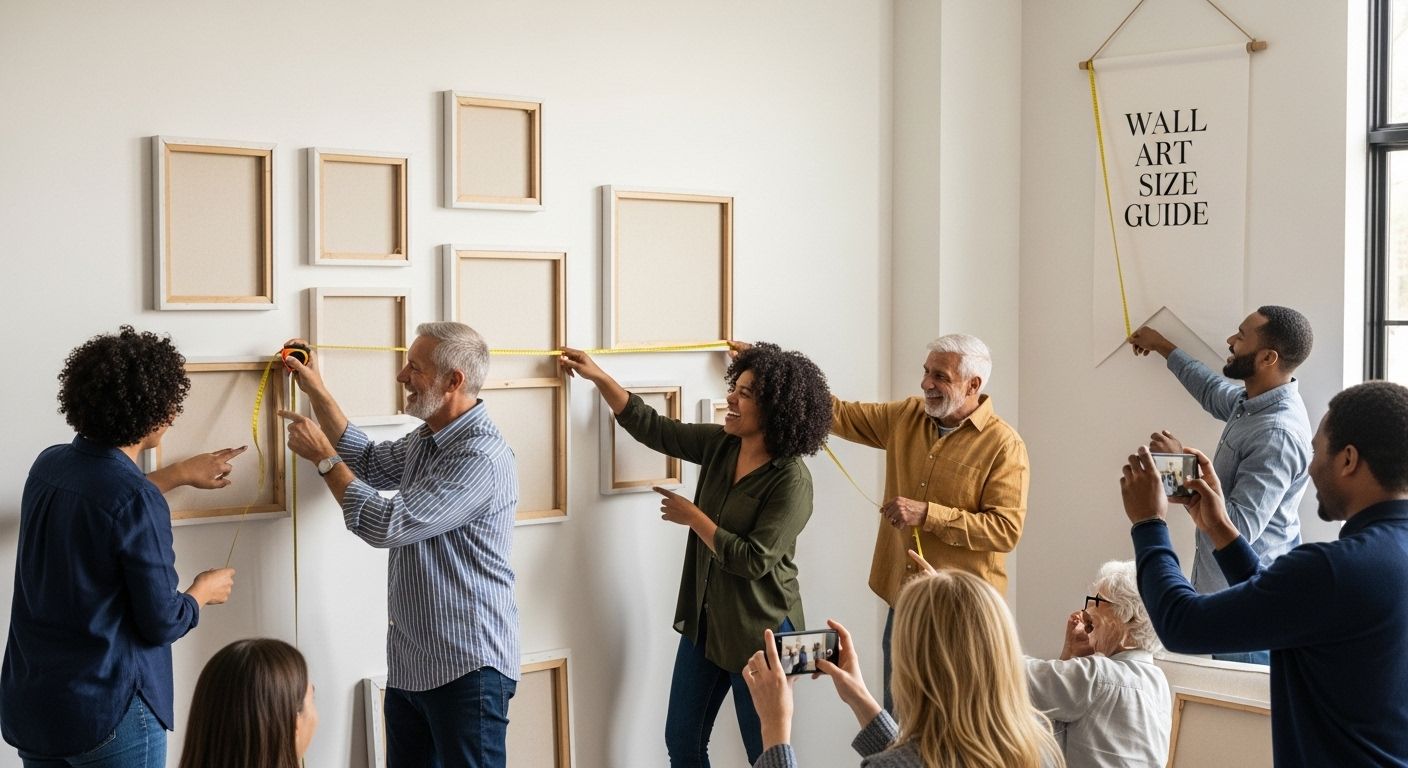Understanding Your Wall Art Size Guide for Perfect Decor
Wall art can completely shift how a room feels and looks. Some designers even recommend that wall art should cover 60 to 75 percent of your open wall space to get the right effect. Most people think picking the right art is all about the image or colors but that’s not the full story. The real secret is in the size and how it can totally change your mood and the entire atmosphere of your home.

Table of Contents
- What Is The Importance Of Wall Art Sizes?
- Why Choosing The Right Size Matters For Your Space
- How Wall Art Size Influences Aesthetics And Harmony
- Key Concepts In Selecting Wall Art Dimensions
- How To Visualize Wall Art Sizes In Different Settings
Quick Summary
| Takeaway | Explanation |
|---|---|
| Choose art sizes for visual balance. | Ensuring wall art covers 60-75% of wall space fosters harmony and prevents visual dissonance in the room. |
| Consider emotional impacts of art size. | Different sizes evoke distinct feelings—large pieces energize, while small ones promote intimacy. |
| Utilize proportional thinking in placement. | Maintain space of 6-8 inches between art and surrounding furniture to achieve a cohesive look. |
| Tailor art to room functions. | Select sizes that enhance the room’s purpose—bold pieces for excitement; smaller for calmness. |
| Visualize before purchasing art. | Use painter’s tape or digital tools to simulate art dimensions and ensure compatibility with your space. |
What is the Importance of Wall Art Sizes?
Choosing the right wall art size is far more than a simple decorative decision—it’s a critical design strategy that profoundly impacts your living space’s aesthetic and emotional atmosphere. Discover how wall art transforms spaces by understanding the nuanced relationship between art dimensions and room dynamics.
Visual Balance and Proportion
Wall art size directly influences a room’s visual harmony. According to research from the National Kitchen & Bath Association, scale and proportion are fundamental principles in interior design that determine how objects interact within a space. An improperly sized piece can disrupt the entire room’s aesthetic equilibrium.
Key considerations for visual balance include:
- Ensuring wall art covers approximately 60-75% of available wall space
- Maintaining proportional relationships with surrounding furniture
- Creating visual weight that complements architectural elements
Psychological and Emotional Impact
Beyond aesthetic considerations, wall art size plays a significant role in psychological perception. Scientific research demonstrates that interior design elements, including artwork, can substantially influence emotional responses and environmental comfort. A well-proportioned art piece can:
- Reduce visual stress
- Create a sense of calm and spaciousness
- Enhance overall room ambiance
Ultimately, understanding wall art sizing is about creating intentional, harmonious spaces that reflect personal style while maintaining design integrity. The right dimensions transform mere decorative elements into powerful visual narratives that speak volumes about your aesthetic sensibilities.
Why Choosing the Right Size Matters for Your Space
Selecting the appropriate wall art size is an intricate process that goes beyond mere aesthetic preference. It requires a nuanced understanding of spatial dynamics, design principles, and personal expression. Explore personalized wall art options that transform your living spaces with precision and style.
Creating Visual Harmony
Every room has a unique visual language, and wall art serves as a critical communication tool within that language. According to research from Ohio University, spatial perception is dramatically influenced by the strategic placement and sizing of interior design elements. An improperly sized art piece can create visual dissonance, disrupting the room’s natural flow and emotional resonance.
Critical considerations for visual harmony include:
- Maintaining proportional relationships between art and surrounding furniture
- Ensuring artwork complements architectural features
- Balancing negative space to prevent visual overcrowding
Room Function and Emotional Impact
Wall art size plays a profound role in defining a room’s functional and emotional character. The dimensions of your artwork can subtly influence how a space feels and functions. A large, bold piece can create a focal point and energize a room, while smaller, more intricate works can introduce intimacy and sophistication.
Emotional responses triggered by art sizing:
- Large art pieces create a sense of drama and excitement
- Medium-sized art promotes balanced, comfortable environments
- Small art collections encourage intimate, contemplative spaces
Ultimately, choosing the right wall art size is an art form in itself—a delicate balance between mathematical precision and intuitive design. It requires understanding your space’s unique personality, architectural characteristics, and the emotional narrative you wish to create.
How Wall Art Size Influences Aesthetics and Harmony
The aesthetic impact of wall art extends far beyond simple decoration—it is a sophisticated interplay of spatial relationships, visual dynamics, and emotional resonance. Explore curated design collections that transform your living spaces with intentional artistry.
Spatial Composition and Visual Balance
According to research from the National Science Foundation, aesthetic appreciation is deeply rooted in spatial composition and perceptual harmony. Wall art size serves as a critical element in creating visual equilibrium, acting as a visual anchor that either stabilizes or disrupts a room’s design language.
Key principles of spatial composition include:
- Maintaining proportional relationships between art and architectural elements
- Creating strategic focal points that guide visual movement
- Balancing visual weight across different areas of the room
Psychological Perception and Emotional Resonance
The dimensions of wall art profoundly influence psychological perception and emotional experience. Different art sizes communicate distinct emotional narratives, transforming spaces from mere physical environments into dynamic, expressive landscapes.
Emotional impacts of art sizing:
- Large art pieces generate a sense of boldness and dramatic presence
- Medium-sized artworks promote a sense of balanced comfort
- Smaller art collections create intimate, contemplative atmospheres
Ultimately, wall art sizing is a nuanced art form that requires intuitive understanding and strategic design thinking. It’s about crafting visual experiences that resonate with personal style, architectural context, and emotional intention—turning walls into powerful storytelling canvases that speak without words.
Key Concepts in Selecting Wall Art Dimensions
Choosing wall art dimensions transcends simple measurement—it’s a deliberate design strategy that requires understanding complex spatial relationships and aesthetic principles. Explore personalized art solutions that transform your living spaces with precision and creativity.
Fundamental Design Principles
According to research from Florida International University, selecting wall art dimensions involves mastering core design elements that govern visual perception. These principles form the foundation of creating harmonious and visually compelling spaces.
**Critical design elements to consider:

**
- Understanding the relationship between positive and negative space
- Recognizing how line, shape, and proportion interact
- Analyzing the visual weight of different art dimensions
Spatial Perception and Proportional Thinking
Wall art sizing is an intricate dance of proportions, where each piece must communicate with its surrounding environment. The dimensions you choose should create a dialogue between the artwork, furniture, and architectural elements, establishing a cohesive visual narrative.
Key proportional considerations:
- Art should typically cover 50-75% of the wall space above furniture
- Maintain 6-8 inches of space between artwork and surrounding objects
- Consider ceiling height and room dimensions when selecting art size
Ultimately, selecting wall art dimensions is an intuitive process that blends mathematical precision with creative expression. It requires a keen eye for spatial relationships, an understanding of design principles, and the confidence to trust your aesthetic instincts.
How to Visualize Wall Art Sizes in Different Settings
Mastering wall art visualization requires more than intuition—it demands strategic spatial planning and an understanding of how art interacts with different environments. Discover custom sizing solutions that transform your living spaces with precision and creativity.
Room-Specific Visualization Strategies
Each room presents unique spatial challenges that require tailored approaches to wall art sizing. Living rooms, bedrooms, and home offices demand distinct visual strategies that complement their functional characteristics and architectural elements.
Visualization techniques for different spaces:
- Use painter’s tape to outline potential art dimensions on walls
- Create digital mockups using room layout apps
- Take photographs of the space to assess visual proportions
Scale and Proportion Techniques
Visualization is fundamentally about understanding how art dimensions interact with existing architectural elements. The goal is to create a harmonious visual dialogue that enhances rather than disrupts the room’s inherent design language.

Proportion assessment methods:
- Compare art size to furniture width (ideal coverage is 50-75%)
- Measure wall height and divide into visual thirds
- Consider ceiling height when selecting vertical art dimensions
Mastering wall art visualization is an intuitive process that combines technical measurement with creative imagination. It requires patience, experimentation, and a willingness to see your space as a dynamic canvas waiting to be transformed by thoughtful artistic selections.
Bring Your Wall Art Sizing Guide to Life with Personalized Solutions
You’ve just learned how choosing the right wall art size can create balance, harmony, and an emotional connection in any room. But finding art with the perfect dimensions and story can feel overwhelming. Many homeowners struggle to match their wall’s proportions or to select artwork that truly reflects who they are. The right art size can transform a house into a home filled with meaning.
Discover how easy it can be to solve these challenges with Personalized Canvas Wall Art Prints. Explore options made just for you, from custom names and dates to themes that resonate with your life’s story.

Ready to create harmony and emotional impact on your walls? Visit FunLifeNow and see how you can personalize each piece for a one-of-a-kind home. Start your project now, choose your size with confidence, and enjoy home décor crafted from the heart.
Frequently Asked Questions
How do I choose the right size for wall art in my home?
Choosing the right size for wall art involves understanding the proportional relationships between the artwork and surrounding furniture, as well as ensuring the art covers approximately 60-75% of available wall space for visual balance.
What is the psychological impact of wall art size on a room’s atmosphere?
The size of wall art can greatly influence emotions and ambiance. Larger pieces often energize a space, while smaller works can create a sense of intimacy and calm.
How can I visualize wall art sizes in my space before purchasing?
You can visualize wall art sizes by using painter’s tape to outline potential dimensions on your walls, creating digital mockups with room layout apps, or taking photographs of the space to assess visual proportions.
What are the recommended spacing guidelines for hanging wall art?
It’s typically recommended to maintain 6-8 inches of space between the artwork and surrounding objects, and artwork should ideally cover 50-75% of the wall space above furniture to achieve a balanced look.
Recommended
- Best Memories Made Gathered Around Table - Blue - Premium Custom Canva – FunLifeNow
- Lake House Anchor-Tan-Family Premium Custom Canvas Wall Art – FunLifeNow
- Barn Wheat Field - Multi-Names Premium Custom Canvas Wall Art – FunLifeNow
- Basement Bar Lounge - Oak Wood Texas Star -Family Premium Custom Canva – FunLifeNow
